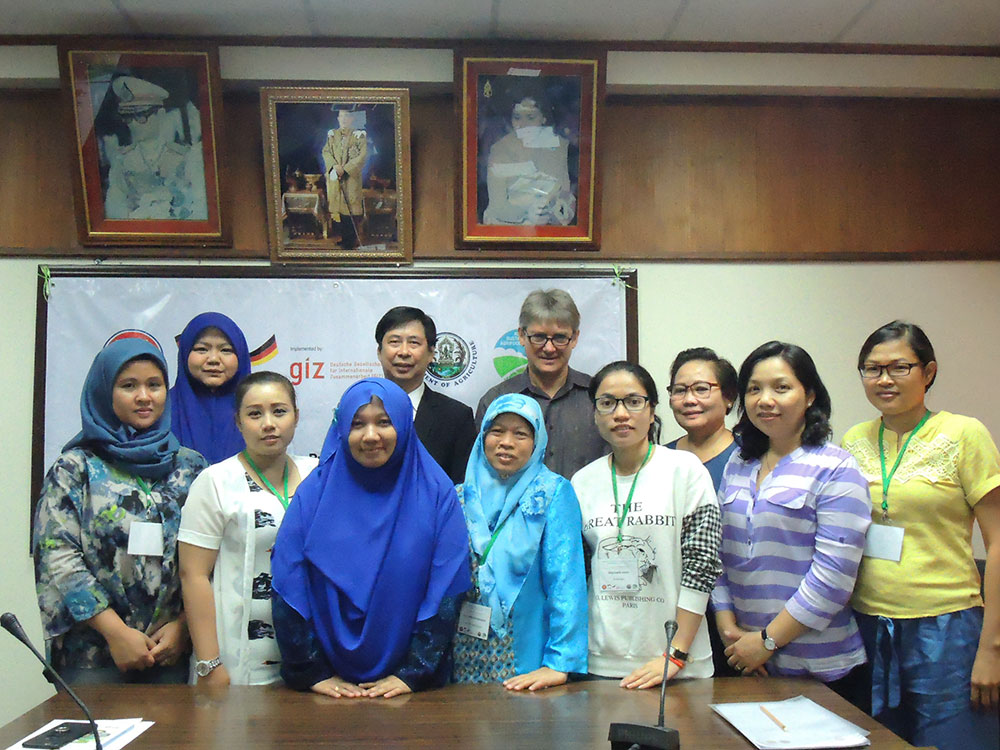Overcoming obstacles in the production of environmentally friendly plant protection products and organisms, as well as adoption by farmers may not be easy. However, government officials from ASEAN Member States believe that change will come.
Female government officers from four ASEAN countries who attended a training about rearing natural enemies for pest control in the recent ‘Regional Training Workshop on Mass Production of Beneficial Insects and Nematodes’ in Bangkok, Thailand shared their views and hopes in the future of biocontrol agents (BCA).
 “I think the use of biological agents in the future is very necessary to continue to be supported and socialized continuously, given the current agricultural conditions are increasingly apprehensive,” said Ms. Heny Novriyanty, an Assistant Agriculture Official from Directorate of Horticulture Protection, Ministry of Agriculture, Indonesia.
“I think the use of biological agents in the future is very necessary to continue to be supported and socialized continuously, given the current agricultural conditions are increasingly apprehensive,” said Ms. Heny Novriyanty, an Assistant Agriculture Official from Directorate of Horticulture Protection, Ministry of Agriculture, Indonesia.
Mrs. Heny stated that even though there were challenges that prevent biocontrol agents from being produced and widely used in her country, Indonesia, such as difficulty in registering of BCA product, lack of technology and investment, and farmers’ prioritization of chemical pesticides; there was still room for change and optimism.
“There is still a spirit to return to a healthy and natural farm. One way is by the use of biological agents in the control of plant pest organisms. Nowadays, people are increasingly aware of the importance of consuming healthy foods,” she said.
 For Malaysia, Ms. Fardiah Md Nor, an Assistant Agriculture Officer of Plant Biosecurity Division, Department of Agriculture, shared that her country encounter problems with “mentality and lack of commitment from stakeholders because it takes a lot of time and money whereas other methods like pesticides provide immediate results. Lack of knowledge in economic threshold level and ecology of certain pest is also a problem in deciding to use the right beneficial agents.”
For Malaysia, Ms. Fardiah Md Nor, an Assistant Agriculture Officer of Plant Biosecurity Division, Department of Agriculture, shared that her country encounter problems with “mentality and lack of commitment from stakeholders because it takes a lot of time and money whereas other methods like pesticides provide immediate results. Lack of knowledge in economic threshold level and ecology of certain pest is also a problem in deciding to use the right beneficial agents.”
However, in her opinion she said: “this situation is getting better and will change eventually if research institution, expertise more focus on developing method or research in beneficial agents and vigilant all the time to organize counter attack of any pest.”
 Ms. Marineth Vinin, an Official of Department of Agricultural Legislation, Ministry of Agriculture, Forestry and Fisheries (MAFF), shared that Cambodia also faced with difficulties on the “lack of technical knowledge of government agents, MAFF officers, farmer not interest[ed] in using these products, lack of promotion from relevant stakeholders, [and] regulation management in these products still not yet adopted.”
Ms. Marineth Vinin, an Official of Department of Agricultural Legislation, Ministry of Agriculture, Forestry and Fisheries (MAFF), shared that Cambodia also faced with difficulties on the “lack of technical knowledge of government agents, MAFF officers, farmer not interest[ed] in using these products, lack of promotion from relevant stakeholders, [and] regulation management in these products still not yet adopted.”
When asked if this situation will change in the future, she replied: “It will be changed in the future by good cooperation between the government in ASEAN countries and also the local government in terms of promoting the use and trade of these products.”
 In Vietnam, Ms. Diem Huynh Thi Ngoc, a Technical Manager of Southern Regional Plant Protection Center (SRPPC), Plant Protection Department, Ministry of Agriculture and Rural Development, also experienced obstacles that prevent BCA from being widely used and mass produced.
In Vietnam, Ms. Diem Huynh Thi Ngoc, a Technical Manager of Southern Regional Plant Protection Center (SRPPC), Plant Protection Department, Ministry of Agriculture and Rural Development, also experienced obstacles that prevent BCA from being widely used and mass produced.
“I think that we meet the obstacles because we don’t [have] enough condition to enlarge. For small apply area, it can’t persuade farmers. They don’t believe and follow us. They still apply pesticide.”
Yet, despite these difficulties she said: “From my perspective, I think that we will change”.
The Regional Training Workshop on Mass Production of Beneficial Insects and Nematodes organized on 15 – 19 May 2017 was attended by nine government officers from seven ASEAN countries: Brunei Darussalam, Cambodia, Indonesia, Lao PDR, Malaysia, the Philippines, and Vietnam. The workshop was designed to provide participants with knowledge and skills necessary to further develop and implement mass production of biological control agents in their own countries. The workshop was hosted by ASEAN Sustainable Agrifood Systems (ASEAN SAS) project in collaboration with Plant Protection Research and Development Office (PPRDO), Department of Agriculture, Thailand.
Relates articles can be read at
Learning about living organism for plant protection in Brunei Darussalam in seven questions
‘No, we don’t have any problem at the moment. Yes, we need more people in the future.’

